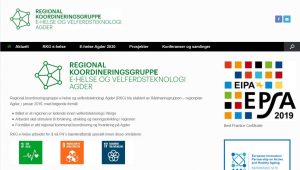Description of the collaboration

© RKG Agder website: https://www.ehelseagder.no/rkg-e-helse/
The Regional coordination group eHealth and welfare technology Agder (RKG), was established in 2016. It is a project-based network with a unique structure which gathers health professionals and healthcare workers at the regional level in the Norwegian county of Agder. RKG aims at implementing welfare technology, sharing experiences, and coordinating procurement processes within eHealth. It is primarily based on the involvement of the representatives of regions and municipalities’ health leader networks. Actors include the Norwegian Association of Local and Regional Authorities (KS), the County Governor of Agder, representatives of Agder County Municipality are also a part of the RKG with observatory status.
Impact of ICT on collaboration
Ensuring innovative collaboration and working in an effective, environmentally-friendly way, is one of the main objectives of the RKG, and information and communication technology (ICT) has played a very important role in ensuring successful collaboration. Since its establishment in 2016, most of its meetings have been organised digitally.
The digital working practices enabled functioning of RKG’s structure, centred around involvement of the leadership-level representatives of Agder’s regions (municipalities). Heads of Municipal Affairs representing health leader networks are busy people engaged in many activities, thus organising meetings digitally facilitated their participation in the RKG in a more efficient way.
The ICT tools, like Microsoft Teams, Skype for Business or digital platforms (LinkedIn, Facebook) and the RKG website were also key to the working practices in the RKG, especially for facilitating knowledge and document sharing, informing the participants about different initiatives, and engaging all relevant actors.
Impact of collaboration on efficiency
The impact of the collaboration on efficiency is primarily reflected in perceived effects such as economies of scale (saving time and resources) and overall improved quality of the eHealth services in Agder.
The first effect – economies of scale, is expressed by the benefits achieved by the Agder municipalities thanks to a ‘smart way of working’ and a joint organisation of processes through procurement regulations and joint framework agreements. Instead of being performed by 25 municipalities individually, these are now coordinated by the RKG. There is also a time-saving factor in relation to mutual learning. Sharing the experiences connected to different processes by one of the municipalities facilitates and accelerates the experience of others.
In relation to the ICT aspect, the use of digital tools has contributed to optimizing collaboration and making processes within the RKG more efficient. For instance, Microsoft Teams is not only used for video conferencing, but also to facilitate planning and decision-making activities. As a result, following up on different RKG’s tasks becomes more efficient. Holding meetings digitally has saved travel costs, saved time, and avoided CO2 emissions.
Other efficiency gains can be perceived in the respective projects coordinated by the RKG. There can be variations from project to project, but feedback on the quality of services in Agder is generally very positive. For example, the Municipal Response Center hosted by Kristiansand Municipality is responsible for handling alarms for several municipalities (also beyond the Agder county). This results in saved time and resources, as the Center responds to many alarms which other actors then do not have to be engaged in. For example, in the project «Implementation of welfare technology Agder», which was coordinated by the RKG, the introduction of supplementary technology helped the users in receiving certain health/welfare services at home, avoiding institutional spaces.
Impact of collaboration on red tape
Some effects relating to red tape can be perceived in RKG’s activities. The factor that stands out in that regard is the synergy effect on the performance that the collaboration has achieved. The RKG as a coordinating actor facilitates numerous activities – procurement, negotiating framework agreements, regional planning within eHealth and welfare, implementation of new technology, etc. These activities would otherwise be performed separately by 25 municipalities, from start to finish. Coordination of different processes, including decision-making, by one group instead of being handled by several institutions resulted in reduced bureaucracy.
In contrast, increased centralisation (and when the collaboration itself becomes a big organization, including many levels and functions) can sometimes in itself also result in introducing elements of red tape – for instance when the leaders of the respective projects within the framework of the RKG are dependent on the decision of RKG’s steering group. This results in a risk of losing momentum in some processes in a project.
Implications and lessons learned
Several factors stand out as key learning points from the RKG case:
- Building the entire collaboration structure around the active involvement of the leadership-level representatives of health leader networks which have a central role in the collaboration, is crucial. The combination of this buy-in, securing legitimacy of the collaboration’s actions, and ensuring adequate drivers (thus motivation) for the collaboration were the most important success factors for the RKG.
- The role of ICT cannot be underestimated. The digital aspect did not only enable the smooth functioning of the RKG and meeting the collaboration’s objectives (i.e., sharing knowledge and experiences, joint decision-making), facilitate participation of the leaders within the field of health in the region, but also had a positive impact on efficiency (saved time and resources without much additional cost).
- The questions of efficiency and red tape are interconnected. Certain effects resulting from the collaboration, like the synergy effect of one coordinating actor performing tasks once that otherwise 25 municipalities would have to complete each separately, illustrates both increased efficiency and reduced bureaucracy.
You can read the full case study here.
To read more about this research, see D9.1 – A Review of Efficiency and Red Tape in Public Sector Collaborations report.
Further materials/sources
Regional coordination group eHealth and welfare technology Agder website (in Norwegian), available here.
European Public Sector Award RKG case description.
Presentation about the RKG in English, here.
About the Author
Karolina Poltorak, University of Bergen
